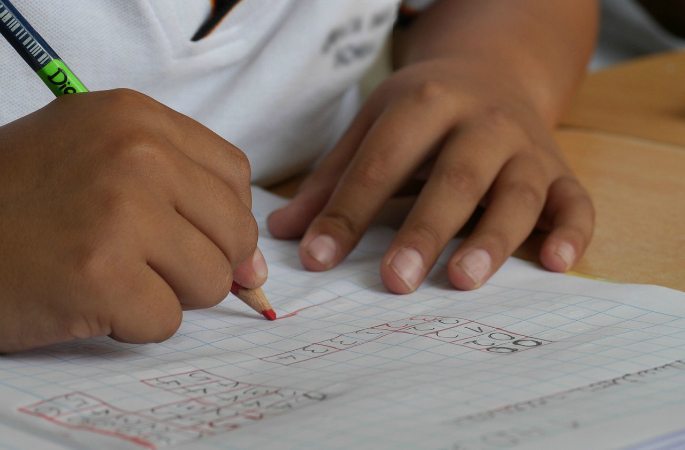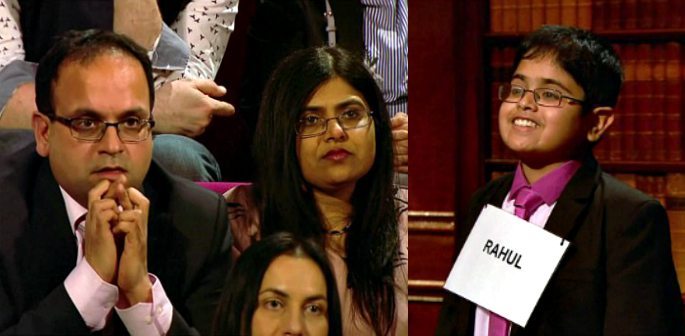"My role is to bring out the confidence in Rahul that he is the best in the competition."
Channel 4 aired its brand new series of Child Genius on 14th August 2017. A programme in which super smart children tackle a series of challenges, to see who will become deemed as the UK’s smartest child and win the top prize.
Among the contestants this year includes 12-year-old Rahul, who lives in London with his parents and younger sister.
With an IQ of 162, he has impressed viewers with his outstanding skills in spelling and maths.
However, despite the children showcasing their high intelligence, controversy has arisen. In particular, how some of the parents train their youngsters for the programme. Of who include Rahul’s father and mother, Manish and Komal.
But with some describing the show as “child abuse” and calls for ChildLine to intervene, is the public right to dismiss Rahul’s parents as pushy? Or are they simply typical Indians?
The controversy arisen shortly after the programme began airing. On social media, many deemed the training Rahul and the other children received from their parents as “verging on child abuse” and described Manish and Komal as “pushy parents”.
I hope Rahul when a love grows up to be happy, just to annoy his pushy parents #childgenius #childline
— Lol Williams ???? (@lollywould) August 14, 2017
#ChildGenius Can't believe this is on again. Some of what they showed last series was bordering on child abuse. Too young for that pressure.
— Ash? (@AshtheTabbyCat) August 14, 2017
However, despite these thoughts on Twitter, one can argue that Rahul’s parents are acting as typical Indians. Throughout the British Asian community, as well as in India, many would relate to the pressure Manish and Komal place on their smart son.
Cruel to be Kind?
In an everyday Indian household, parents can usually expect their children to achieve their potential and even go beyond.
A lot of British Asians will have grown up with certain academic pressures from their parents. It follows the belief that becoming the best can feel like the only option to succeed.
Many of these parents, when they were younger, would have faced a difficult time themselves. With limited opportunities out there and little information available, they may not have had the chance to achieve their own potential or realise their dreams.
As one can naturally understand, these Indian parents would want a better life for their children.
And particularly in this modern time, when going to university has become the norm and job prospects increasingly difficult, Indian parents will worry for their children’s livelihoods. This means that the pressure placed on them comes from good intentions.
Not regarding it as child abuse, they would see it more as a benefit for their child. An enriching time where they can excel in their intelligence, meaning better prospects overall for both university and employment later in life.

In the case of Rahul’s parents in Child Genius, this certainly suggests the case. Manish explains that the training he gives his son isn’t simply just make to him achieve his maximum potential. He says:
“My role is to bring out the confidence in Rahul that he is the best in the competition. He’ll say maybe. But the ‘maybe’ has to become: ‘Yes I will win.'”
In addition, Manish also explains how the whole family aim to continually self-improve in their lives, saying: “We’re all achievers.” Meaning that Indian parents may also strive to improve their own prospects, as well as their children’s.
He also added: “We’re always trying to better ourselves. It’s about taking the next step.”
Overall, many on social media may have over exaggerated their claims of “pushy parents” and “child abuse”. Even Child Genius‘ Rahul himself has explained that he enjoys learning, saying: “Most kids want immediate gratification but I also want long term gratification.
“If I could play my X-Box now, I’d be really happy now but I’ll be sad later on because I haven’t revised for my test.”
Placing focus on achievement may seem harsh to some. But one can argue it follows the ‘cruel to be kind’ thought.
It seems then, Manish and Komal are acting as typical Indian parents. Only wanting the best for their son; to achieve his potential and dreams.






























































